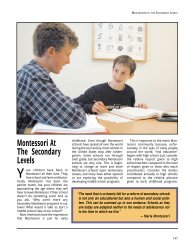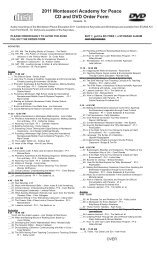Tim Seldin & Paul Epstein Ph.D. An Education for Life
Tim Seldin & Paul Epstein Ph.D. An Education for Life
Tim Seldin & Paul Epstein Ph.D. An Education for Life
You also want an ePaper? Increase the reach of your titles
YUMPU automatically turns print PDFs into web optimized ePapers that Google loves.
APPENDIXES<br />
embarrassment. Dr. Montessori argued<br />
that <strong>for</strong> an education to touch children’s<br />
hearts and minds profoundly,<br />
students must be learning because<br />
they are curious and interested, not<br />
simply to earn the highest grade in the<br />
class.<br />
Montessori children compete with<br />
each other every day, both in class and<br />
on the playground. Dr. Montessori,<br />
herself an extraordinary student and a<br />
very high achiever, was never opposed<br />
to competition on principle. Her objection<br />
was to using competition to<br />
create an artificial motivation to get<br />
students to achieve.<br />
Montessori schools allow competition<br />
to evolve naturally among children,<br />
without adult interference unless<br />
the children begin to show poor<br />
sportsmanship. The key is the child’s<br />
voluntary decision to compete rather<br />
than having it imposed on him by the<br />
school.<br />
234<br />
Is It True that Montessori<br />
Children Never Play?<br />
All children play! They explore new<br />
things playfully. They watch something<br />
of interest with a fresh open<br />
mind. They enjoy the company of<br />
treasured adults and other children.<br />
They make up stories. They dream.<br />
They imagine. This impression stems<br />
from parents who don’t know what to<br />
make of the incredible concentration,<br />
order, and self-discipline that we commonly<br />
see among Montessori children.<br />
Montessori students also tend to<br />
take the things they do in school quite<br />
seriously. It is common <strong>for</strong> them to<br />
respond, “This is my work,” when<br />
adults ask what they are doing. They<br />
work hard and expect their parents to<br />
treat them and their work with<br />
respect. But it is joyful, playful, and<br />
anything but drudgery.<br />
Is Montessori Opposed to<br />
Fantasy and Creativity?<br />
Fantasy and creativity are important<br />
aspects of a Montessori child’s experience.<br />
Montessori classrooms incorporate<br />
art, music, dance, and creative<br />
drama throughout the curriculum.<br />
Imagination plays a central role, as<br />
children explore how the natural<br />
world works, visualize other cultures<br />
and ancient civilizations, and search<br />
<strong>for</strong> creative solutions to real-life problems.<br />
In Montessori schools, the Arts<br />
are normally integrated into the rest<br />
of the curriculum.<br />
What’s the Big Deal about Freedom<br />
<strong>An</strong>d Independence in Montessori?<br />
Children touch and manipulate everything<br />
in their environment. In a<br />
sense, the human mind is handmade,<br />
because through movement and<br />
touch, the child explores, manipulates,<br />
and builds a storehouse of<br />
impressions about the physical world<br />
around her. Children learn best by<br />
doing, and this requires movement<br />
and spontaneous investigation.<br />
Montessori children are free to<br />
move about, working alone or with<br />
others at will. They may select any<br />
activity and work with it as long as<br />
they wish, so long as they do not disturb<br />
anyone or damage anything, and<br />
as long as they put it back where it<br />
belongs when they are finished.<br />
Many exercises, especially at the<br />
early childhood level, are designed to<br />
draw children’s attention to the sensory<br />
properties of objects within their<br />
environment: size, shape, color, texture,<br />
weight, smell, sound, etc.<br />
Gradually, they learn to pay attention,<br />
seeing more clearly small details in<br />
the things around them. They have<br />
begun to observe and appreciate<br />
their environment. This is a key in<br />
helping children discover how to<br />
learn.




